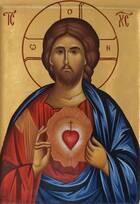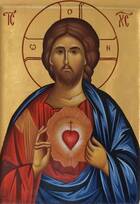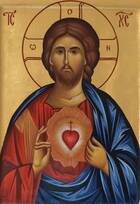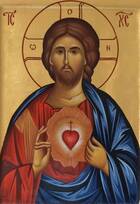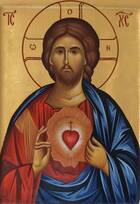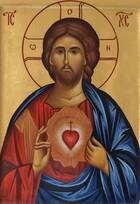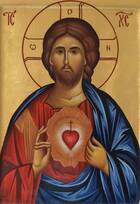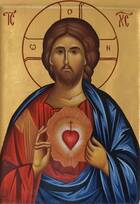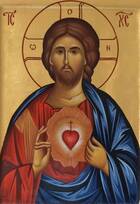Reflections on the Litany of the Sacred Heart
Given by Pope St John Paul II before the Sunday Angelus
Son of the eternal Father 
"Heart of Jesus, Son of the eternal Father"
"The Church finds in the heart of Christ access to the God who is the most holy Trinity, to the Father, the Son and the Holy Spirit. This single God – one and triune together – is an ineffable mystery of faith. Truly he “dwells in unapproachable light” (1 Tm 6, 16).
And at the same time the infinite God has allowed himself to be embraced by the Heart of that Man whose name is Jesus of Nazareth: Jesus Christ. And through the heart of the Son, God the Father also approaches our hearts and comes to them.
Thus each of us is baptised “in the name of the Father, of the Son and of the Holy Spirit”. Each one of us is, from the very beginning, immersed in the one and triune God: in the living God, in the life-giving God. This God we confess as the Holy Spirit who, proceeding from the Father and from the Son, “gives life”.
The heart of Jesus is “formed by the Holy Spirit in the womb of the Virgin Mother”.
God who “gives life”, who “gives himself to man”, began the work of his salvation economy, by becoming man.
Precisely in the virginal conception and in the birth by Mary was His human heart begun “formed by the Holy Spirit in the womb of the Virgin Mother”.
We want to venerate this heart during the month of June. Today we want to make this heart the sole trustee of our poor human hearts, hearts that are tested in different ways, oppressed in different ways. And at the same time: hearts that are confident in the power of God himself and in the saving power of the holy Trinity.
Mary, Virgin Mother, who knows better than us the divine heart of your Son, join us in today’s adoration of the most holy Trinity: and together in humble prayer for the Church and for the world!
May you alone be the guide of this our prayer." - JPII, Angelus, 2 June 1985
formed by the Holy Spirit in the womb of the Virgin Mary 
“Heart of Jesus, formed by the Holy Spirit in the womb of the Virgin Mary, have mercy on us.” We pray this in the litany to the Sacred Heart of Jesus.
This invocation refers directly to the mystery we meditate when reciting the Angelus of our Lord: through the work of the Holy Spirit there was formed in the womb of the Virgin of Nazareth the Humanity of Christ, Son of the Eternal Father.
Through the work of the Holy Spirit, the Heart was formed in this humanity! The Heart, which is the central organ in Christ’s human organism and, at the same time, the true symbol of his interior life: of his thoughts, his will, his feelings. Through this heart the humanity of Christ is, in a particular way, “the temple of God” and at the same time, through this Heart, it remains unceasingly open to man and to everything which is “human”: “the Heart of Jesus, of whose fullness we have all received.”
The month of June is, in a particular way, dedicated to the veneration of the divine Heart. Not just one day, the liturgical feast which usually occurs in June, but every day. Connected with it is the devout daily practice of reciting or singing the Litany to the Sacred Heart of Jesus.
It is a marvellous prayer, fully concentrated on the interior mystery of Christ: God-Man.
The Litany to the Heart of Jesus draws abundantly from biblical sources and, at the same time, reflects the deepest experiences of human hearts. At the same time, they are prayers of veneration and of authentic dialogue.
We speak in it of the heart and, at the same time, we allow our hearts to speak with this unique Heart, which is “the source of life and holiness” and “the desire of the eternal hills”. With the Heart which is “patient and most merciful”, and “generous to everyone who invokes it”.
This prayer, recited and meditated upon, becomes a true school of the interior man: the school of the Christian.
The Solemnity of the Sacred Heart of Jesus reminds us above all of the moments when this Heart was “pierced with a lance” and, through this, was open in a “visible” way to man and to the world.
In reciting the Litany – and in venerating the divine Heart – we learn the mystery of Redemption in all its divine and also human depth.
At the same time, we become sensitive to the need for reparation. Christ opens his Heart to us because in his reparation we can join with him for the salvation of the world. The language of his pierced Heart speaks the whole truth about his Gospel and about Easter.
Let us try always better to understand this language. Let us learn it." - JPII, Angelus, 27 June 1982
substantially united to the Word of God 
"'Heart of Jesus, substantially united to the Word of God, have mercy on us.' The expression 'Heart of Jesus' immediately calls to mind the humanity of Christ, and emphasizes the richness of his feelings, his compassion towards the sick; his preference for the poor; his mercy towards sinners; his tenderness towards children; his strength in denouncing hypocrisy, pride, violence; his meekness in front of his opponents; his zeal for the glory of the Father and his jubilation in the mysterious and providential workings of grace.
With reference to the facts of the Passion, the expression “Heart of Jesus” then draws out the sadness of Christ at the betrayal by Judas, the discouragement of his loneliness, his agony before death, his filial and obedient abandonment into the hands of the Father. And it speaks above all of the love which flows unceasingly from within him: infinite love towards the Father and love without limits towards man.
Now, this Heart so humanly rich, “is united – the Litany reminds us – to the Person of the Word of God”. Jesus is the Word of God incarnate; in him there is only one person – the eternal person of the word - subsisting in two natures, the divine and the human. Jesus is one, in the indivisible reality of his being and is, at the same time, perfect in his divinity, perfect in our humanity; he is equal to the Father, in all that concerns his divine nature, equal to us, with regard to human nature; true Son of God and true Son of man. The Heart of Jesus then, from the moment of the Incarnation, has been and always will be united to the Person of the Word of God.
Through the union of the Heart of Jesus to the Person of the Word of God we can say: in Jesus, God loves humanly, suffers humanly, rejoices humanly. And vice versa: in Jesus, human love, human suffering, human glory acquire divine intensity and power.
Gathered, dear brothers and sisters, for the prayer of the Angelus, let us contemplate with Mary the Heart of Jesus. The Virgin lived in faith, day after day, next to her Son Jesus: she knew that the flesh of her Son had flourished in her virginal womb; but she knew that because he was “the Son of the Most High" (Lk 1, 32), he infinitely transcended her: the Heart of her Son was, in fact, “united to the Person of the Word”. Hence she loved him as her Son and, at the same time, adored him as her Lord and God. May she grant us also to love and adore Christ, God and man, above all things, “with all our heart, with all our soul and with all our mind”. In this way, following her example, we will be the object of the divine and human predilections of the heart of her Son." - JPII, Angelus, 9 July 1989
of infinite majesty 
"Through the immaculate heart of Mary we want to turn to the divine heart of her son, to the heart of Jesus, of infinite majesty!"
Behold: the infinite majesty of God was hidden in the human heart of the Son of Mary.
This heart is our alliance.
This heart is the greatest closeness of God in regard to human hearts and human history.
This heart is the wonderful “condescension” of God: the human heart which pulsates with divine life: the divine life which pulsates in the human heart.
In the most holy Eucharist, with the “sense of faith” we discover the same heart
- the heart of infinite majesty, which continues to pulsate with the human love of Christ, God-man.
- how profoundly Pope Pius X, former patriarch of Venice, felt this love;
- how greatly he desired all Christians, from early childhood, to approach the Eucharist, making their Holy Communion: to unite themselves to this heart which, at a time, is for every man “the house of God and the gate of heaven.”
“House”: here, through Eucharistic Communion the heart of Jesus extends his home to every human heart.
“Gate”: here, in each of these human hearts He offers the prospect of eternal union with the most Holy Trinity.
Mother of God! While we meditate on the mystery of your annunciation, draw us close to this divine heart:
- heart of infinite majesty
- house of God and gate of heaven
- this heart which, from the moment of the annunciation by the angel, began to beat close to your virginal and maternal heart." - JPII, Angelus, 16 June 1985
holy temple of God 
"At the hour of our communal prayer of the Angelus we turn, together with Mary – through her immaculate heart – towards the divine heart of her Son: the heart of Jesus, holy temple of God; heart of Jesus, tabernacle of the Most High.”
Heart of a man like many, many other human hearts and, at the same time, heart of God the Son. If therefore it is true that every man “dwells”, in some way, in his heart, then in the heart of the man of Nazareth, of Jesus Christ, dwells God. It is the “temple of God”, being the heart of this man.
God the Son is united with the Father, as the eternal Word, “God from God, light from light … begotten not created.”
The Son is united with the Father in the Holy Spirit, who is the “breath” of the Father and of the Son and is, in the divine Trinity, the Person-Love.
The heart of the man Jesus Christ is therefore, in the trinitatian sense, the “temple of God”; is the interior temple of the Son who is united with the Father in the Holy Spirit through the unity of the Godhead. How inscrutable is the mystery of this heart which is the “temple of God” and the “tabernacle of the Most High!"
At the same time, it is the true “house of God with men” (Rev 21, 3) since the heart of Jesus, in its interior temple, embraces all men. Everyone dwells there, embraced by the eternal love. To everyone – in the heart of Jesus – can be addressed the words of the prophet: “I have loved you with an everlasting love, by this you still have mercy.” (Jeremiah 31, 3)
May this power of eternal love, which is in the divine heart of Jesus, be communicated today in a particular way to the young people who have received Confirmation.
In them the Holy Spirit should dwell in a particular way. Hence may their hearts also become - in the likeness of Christ – a “holy temple of God” and a “tabernacle of the Most High.”
I have often heard young people sing: “Do you know that you are the temple?” Yes. We are the temple of God and the Spirit of God dwells in us, according to the words of Saint Paul.
Through the immaculate heart of Mary let us remain in the covenant with the heart of Jesus, which is the “temple of God”, the most splendid and the most perfect “tabernacle of the Most High.” - JPII, Angelus, 9 June 1985
ardent furnace of charity 
"1. Heart of Jesus, ardent furnace of charity.
During the prayer of the Angelus we desire, together with the Mother of God, to turn our hearts towards the heart of her divine Son.
The invocations of these splendid litanies, which we recite or sing especially during the month of June, speak profoundly to us. May the Mother help us to better understand the mysteries of the heart of her Son.
2. "Furnace of charity". The furnace burns. Blazing, it burns any material, whether wood or another easily combustible substance.
The heart of Jesus, the human heart of Jesus, burns with love, which fills it to the brim. And this is the love for the eternal Father and the love for men: for the adopted daughters and sons.
A furnace, burning, goes out little by little. The heart of Jesus, on the other hand, is the inextinguishable furnace. In this it is like that "burning bush" of the book of Exodus, in which God revealed himself to Moses. The bush that burned in the fire, but ... was not "consumed" (Ex 3, 2).
In fact, the love that burns in the heart of Jesus is above all the Holy Spirit, in whom God-the-Son unites Himself eternally to the Father. The heart of Jesus, the human heart of God-man, is embraced by the "living flame" of trinitarian love, which is never extinguished.
3. Heart of Jesus, ardent furnace of charity. A furnace, while it burns, illuminates the darkness of the night and warms the bodies of the frozen wayfarers.
Today we desire to pray to the Mother of the eternal Word, because on the horizon of the life of each and every one of us never ceases to burn the heart of Jesus, ardent furnace of charity. Because it reveals to us the love that does not go out and never deteriorates, the love that is eternal. Because it illuminates the darkness of the earthly night and warms hearts.
4. How much the church rejoices in the fact that human hearts are kindled with love from this divine heart! How much she has joy today, that of such love was kindled the heart of Father Benedict Menni, priest, of the Hospitaller Order of Saint John of God and founder of the Congregation of the Hospitallers of the Most Sacred Heart of Jesus; and the heart of brother Pietro Friedhofen, layman, founder of the Brothers of the Mercy of Mary Help of Christians.
5. Giving thanks for the only love able to transform the world and human life, we address together with the Immaculate Virgin, at the moment of the Annunciation, the divine heart that does not cease to be "an ardent furnace of charity". Ardent: like that "bush" that Moses saw at the foot of Mount Horeb." - JPII, Angelus, 23 June 1985
sanctuary of justice and love 
"Heart of Jesus, sanctuary of justice and love."
The prayer of the Angelus reminds us each time of that salvific moment in which, under the heart of the Virgin of Nazareth, the heart of the Word, the Son of God, began to beat. In her womb he became man, through the workings of the Holy Spirit. In Mary’s womb the man was conceived and the heart was conceived.
This heart is – just like every human heart – a centre, a sanctuary in which the spiritual life pulsates with a special rhythm. The heart, the irreplaceable resonance of everything that the human spirit experiences.
Each human heart is called to pulsate with the rhythm of justice and charity. From it is measured the true dignity of man.
The heart of Jesus beats with the rhythm of justice and love according to the same divine measure! This is precisely the heart of God-man. In him all God’s justice towards man must be done to the end, and also, in a certain sense, the justice of man towards God. In the human heart of the Son of God the justice of God Himself is offered to humanity.
This justice is at the same time the gift of love.
Through the heart of Jesus love enters into human history, as subsistent love: “God loved the world so much that he gave his only Son” (Jn 3,16).
We desire to gaze, with the eyes of the Immaculate Virgin, on the light of that admirable mystery: justice which is revealed as love! Love which fills every measure of justice to the brim! And surpasses it!
Let us pray: that through your heart, O Mother of God, the heart of Jesus as “sanctuary of justice and charity” may become for us all 'the way, the truth and the life.'” - JPII, Angelus, 14 July 1985
full of goodness and love 
"Heart of Jesus, overflowing with goodness and love."
"We wish, in our Sunday angelus prayer, to turn to the heart of Christ, following the words of the Litany. We wish to speak to the heart of the Son through the heart of the Mother. What can be more beautiful than the talk between these two hearts? We wish to participate in it.
The heart of Jesus is a burning furnace of love”, because charity has something of the nature of fire, which burns and blazes to illuminate and heat.
At the same time, in the sacrifice of Calvary the heart of the Redeemer was not destroyed by the fire of suffering. Even if humanly it died, as ascertained by the Roman centurion piercing Christ’s side with a spear, in the divine economy of salvation this heart is still alive, as was manifested at the resurrection.
And here, the living heart itself of the risen and glorified Redeemer is “overflowing with goodness and love: infinitely and superabundantly overflowing. The overflowing of the human heart reaches its divine measure in Christ.
This heart was already like this during the days of earthly life. What is narrated in the Gospel bears witness to this. The fullness of charity is manifested through goodness: through goodness it shone and diffused itself on everyone, firstly on all those suffering and poor, on everyone according to their needs and their truest expectations.
Such is the human heart of the Son of God also after the experience of the cross and of the sacrifice. Indeed, even more so: overflowing with love and with goodness.
At the moment of the annunciation began the conversation of the Mother’s heart with the Son’s heart. We join in this conversation today, meditating on the mystery of the incarnation in the prayer of the Angelus." - JPII, Angelus, 21 July 1985
never-ending source of all virtues 
"Heart of Jesus, abyss of all virtues."
"Under the Mother’s heart the man was conceived. The Son of God was conceived as a man. To venerate the moment of this conception, that is the mystery of the Incarnation, we join in the prayer of the Sunday Angelus.
In the light of the moment of conception, in the light of the mystery of the Incarnation, we look at the whole life of Jesus, born of Mary. Following the invocation of the litany, we try to describe in some way this inner life: through his heart.
The heart determines the depth of man. And in every case, it indicates the extent of this depth, in the interior experience of each one of us, as well as in inter-personal communication. The depth of Jesus Christ, indicated by the measure of his heart, is incomparable. It surpasses the depth of any man, because it is not just human, but at the same time divine.
This divine-human depth of Jesus’ heart is the depth of the virtues, of all the virtues. As a true man Jesus expresses the interior language of his heart through the virtues. In fact, by analyzing his behaviour all these virtues can be discovered and identified, as, historically, they emerge from the knowledge of human morality, as the cardinal virtues (prudence, justice, fortitude, temperance), and the others derived from them (these virtues are possessed to a high degree by the saints and, while always with divine grace, by geniuses of human ethos).
The invocation of the litany speaks in a very beautiful part of an "abyss" of the virtues of Jesus. This abyss, this depth signifies a particular degree of perfection of each virtue and its particular power. This depth and power of each virtue proceeds from love. The more each of the virtues are rooted in love, the greater is their depth.
Furthermore, in addition to love, humility also determines the depth of the virtues. Jesus said: "Learn from me, for I am meek and humble of heart" (Mt 11, 29).
In reciting the Sunday Angelus, let us ask Mary that we may ever draw closer to the heart of her Son. That we may be able to learn from him, from his virtues." - JPII, Angelus, 28 July 1985
king and center of all hearts 
"Heart of Jesus, king and center of all hearts": Jesus Christ is king of hearts. We know that during his messianic activity in Palestine the people, seeing the signs he performed, wanted to proclaim him king.
They saw in Christ a true descendant of David, during whose reign Israel had been at the height of its splendour.
We also know that Jesus of Nazareth, before the tribunal of Pilate, to the question "Are you a king..?" responded: "My kingdom is not of this world.. For this I was born and for this I came into the world: to bear witness to the truth. Anyone who is of the truth hears my voice " (Jn 18, 33. 36-37).
In this way Christ is king of hearts. He never wanted to be temporal sovereign on the throne of David.
He wished only for that kingdom which is not of this world and which, at the same time, is rooted in this world through the truth in human hearts: in the inner man.
For this kingdom he announced the Gospel and performed great signs. For this kingdom, the kingdom of the adopted sons and daughters of God, he gave his life on the cross.
And he reconfirmed this kingdom by his resurrection, giving the Holy Spirit to the apostles and to the men in the Church.
In this way Jesus Christ is the king and center of all hearts.
Meeting him through the truth we draw closer to the kingdom, where God “will wipe away every tear” (Rev 7, 17) because he will be “all in all” (1 Cor 15, 28).
Today, meeting for the usual Sunday prayers of the Angelus, we raise - together with the mother of God - the invocation to the heart of her Son: "Heart of Jesus, king and center of all hearts, have mercy on me." - JPII, Angelus, 25 August 1985
in which are hidden all the treasures of wisdom and science 
"1. Heart of Jesus, in which are hidden all the treasures of wisdom and science.
This invocation of the litanies of the Sacred Heart, taken from the Letter to the Colossians (Col 2, 3), makes us understand the necessity of going to the heart of Christ so as to enter into the fullness of God.
2. The science, of which we speak, is not the science which puffs up (cf 1 Cor 2, 2), founded on human power. It is divine wisdom, a mystery hidden for centuries in the mind of God, creator of the universe (Eph 3:,9). It is a new science, hidden from the wise and intelligent of the world, but revealed to the little ones (Mt 11, 25), rich in humility, simplicity, purity of heart.
This science and this wisdom consist in knowing the mystery of the invisible God, who calls men to be participants in his divine nature and admits them into communion with Him.
3. We know these things because God Himself has deigned to reveal them to us through the Son, who is the wisdom of God (1 Cor 1, 24).
All things, which are on earth and in the heavens, have been created through him and in view of him (Col 1, 16). The wisdom of Christ is greater than that of Solomon (Lk 11, 31). His riches are inscrutable (Eph 3, 8). His love surpasses all knowledge. But with faith we are able to understand, together with all the saints, the breadth, the length, the height, the depth (Eph 3, 18).
Knowing Jesus, we also know God. Who sees Him, sees the Father (Jn 14, 9). With Him, the love of God is poured out into our hearts (Rom 5, 5).
4. Human science is like the water of our sources: who drinks it, returns to being thirsty. The wisdom and science of Jesus, on the contrary, open the eyes of the mind, move the heart into the depths of being and generate man to transcendent love; they liberate from the darkness of error, from the stains of sin, from the danger of death, and lead to the fullness of communion of those divine goods, which transcend the comprehension of the human mind (Dei Verbum, 6).
5. With the wisdom and science of Jesus, we are rooted and grounded in charity (Eph 3, 17). The new inner man is created, who puts God at the center of his own life and puts himself at the service of his brothers.
It is the degree of perfection that reached Mary, Mother of Jesus and our Mother, unique example of a new creature, enriched with the fullness of grace and ready to realize God's will: "Behold the handmaid of the Lord, be it done to me according to the your word ". And it is for this that we invoke her "Seat of Wisdom"." - JPII, Angelus, 1 September 1985
in which the fullness of divinity dwells 
"1. Heart of Jesus, in which the fullness of divinity dwells.
Since the month of June, during the summer Sundays, our prayer of the Angelus has been drawing motives for reflection from the litanies of the Sacred Heart of Jesus.
We are dwelling on the individual invocations and meditating on the great richness of content that is enclosed in them. It is a source of inspiration for our interior life: for our rapport with the mystery of Jesus Christ.
2. Yesterday, through the solemnity of the Exaltation of the Holy Cross, the whole Church once again opened to this heart in which "the fullness of divinity dwells".
The mystery of Christ, God-man, has a particular eloquence when we look at the cross: here is the man! Here is the Crucified One! Here is the man totally stripped! Here is the man "broken because of our sins". Here is the man "covered with opprobrium"!
And, at the same time: here is the man-God! In Him dwells all the fullness of divinity. Of the same substance as the Father! God from God. Light from light! Generated, not created. The eternal Word. One in divinity with the Father and the Holy Spirit.
3. When on Golgotha the centurion with a lance pierced the Crucified One, from his side came forth blood and water. This is the sign of death. The sign of the human death of the immortal God.
4. At the foot of the cross is the Mother. The sorrowful Mother. We remember her the day after the Exaltation of the cross. When the side of Christ is pierced with the centurion's lance, the prophecy of Simeon is fulfilled in her: "A sword will pierce your own soul too" (Lk 2, 25).
The words of the prophet are a preannouncement of the definitive alliance of hearts: of the Son and the Mother; of the Mother and the Son. "Heart of Jesus, in which dwells all the fullness of divinity". Heart of Mary - heart of the sorrowful Virgin - heart of the Mother of God.
May our prayer at the Angelus Domini be united today with that admirable alliance of hearts!" - JPII, Angelus, 15 September 1985
in which the Father is well pleased 
"1. Heart of Jesus, in which the Father is well pleased. Praying thus, particularly now in the month of June, we meditate on that eternal delight that the Father has in the Son: God in God, Light in Light. Such delight also means Love: this Love to which all that exists owes its life: without it, without Love, and without the Word-Son, "nothing was made of all that exists" (Jn 1, 3).
This delight of the Father found its manifestation in the work of creation, in particular in that of man, when God "saw what he had made, and behold, it was good. . . it was very good" (Gen 1, 31).
Thus is not the Heart of Jesus that "point" in which man also can rediscover full confidence in all that is created? He sees the values, he sees the order and the beauty of the world. He sees the meaning of life.
2. Heart of Jesus, in which the Father is well pleased. We go to the riverbank of the Jordan. We go to Mount Tabor. In both the events described by the evangelists the voice of the invisible God is heard, and it is the voice of the Father: "This is my beloved Son, in whom I am well pleased. Listen to him" (Mt 17, 5).
The eternal delight of the Father accompanies the Son, when he was made man, when he accepted the messianic mission to be performed in the world, when he said that his food was to accomplish the will of the Father.
At the end Christ accomplished this will by being obedient unto death on the cross, and then that eternal delight of the Father in the Son, which belongs to the intimate mystery of the Triune God, became part of the history of man. Indeed, the Son himself was made man, and as such he had a man's heart, with which he loved and responded to love. First of all to the love of the Father.
And hence on this heart, on the Heart of Jesus, is concentrated the Father's delight. It is the salvific delight. Indeed, the Father embraces with it - in the heart of His Son - all those for whom this Son became man. All those for whom he has his heart. All those for whom he died and rose again.
In the Heart of Jesus, man and the world rediscover the delight of the Father. This is the heart of our Redeemer. It is the heart of the Redeemer of the world.
3. In our prayer of the Angelus Domini let us unite ourselves to/with Mary. Let us unite ourselves to/with her, from whom the Son of God took a human heart. Let us pray that she will lead us closer to it. Let us pray that, in the heart of the Son, she may bring the delight of the Father, the love of the Father, the Mercy of God, closer to man and to the world." JPII, Angelus, 22 June 1986
of whose fullness we have all received 
"1. Heart of Jesus, of whose fullness we have all received.
Gathered to recite the Angelus, we join Mary at the moment of the annunciation, when the Word was made flesh and came to dwell under her heart: the heart of the Mother. We thus join the heart of the Mother, who from the moment of conception knows better the human heart of her divine Son: "Of his fullness we have all received and grace upon grace", writes the evangelist John (1, 16).
2. What determines the fullness of the heart? When can we say that the heart is full? What is the heart of Jesus full of? It is full of love. Love decides this fullness of the heart of the Son of God, whom we address today in prayer.
It is a heart full of love of the Father: full in a divine and also human way. Indeed, Jesus' heart is truly the human heart of God the Son. It is thus full of filial love: everything that He did and said on earth bears witness to this filial love.
3. At the same time the filial love of the heart of Jesus has revealed - and continually reveals to the world - the love of the Father. The Father "so loved the world that He gave his only-begotten Son" for the salvation of the world; for the salvation of man, so that he "may not perish, but may have eternal life" (Jn 3, 16).
The heart of Jesus is therefore full of love for man. It is full of love for the creature. Full of love for the world. How full it is! This fullness never runs out. When humanity draws on the material resources of the earth, of water, of air, these resources diminish and little by little run out.
Much is spoken on this theme about the accelerated use of these resources that is being carried out in our day. From this derive warnings such as: "Do not use beyond measure". Something totally other happens with love. Something totally other happens with the fullness of the heart of Jesus. It never runs out, nor will it ever run out.
Of this fullness we all receive and grace upon grace. The only requirement is that the measure of our hearts be expanded, our readiness to draw from such superabundance of love." JPII, Angelus, 13 July 1986
desire of the eternal hills 
"1. Heart of Jesus, desire of the eternal hills.
In the course of these Sundays, when we gather for the midday prayer, we are reciting the litanies of the Sacred Heart in particular union with the Mother of Jesus. The Sunday Angelus indeed is our prayer appointment with Mary. Together with her we remember the annunciation, which was certainly a decisive event in her life. And here, in the center of this event, we discover the heart. It is about the love of the Son of God, which from the moment of the incarnation begins to develop under the heart of the Mother together with the human heart of her Son.
2. Is this heart "desire" of the world? Looking at the world as it visibly surrounds us, we must observe with Saint John that it is subject to the concupiscence of the flesh, to the concupiscence of the eyes and to pride of life (cf 1 Jn 2, 16) and this "world" seems to be far from the desire of Jesus' heart. It does not share his desires. It remains a stranger and, at times, even hostile towards him. This is the "world", of which the Council says that it is "placed under the slavery of sin" (Gaudium et Spes, 2). And it says this in accordance with the entire revelation, with Holy Scripture and with Tradition (and even, let us say, with our human experience).
3. Simultaneously, however, the same "world" has been called into existence through the love of the Creator and through this love it is constantly maintained in existence. It is about the world as the whole of visible and invisible creatures, and in particular "the entire human family in the context of all those realities within which it lives" (Gaudium et Spes, 2).
It is the world that, precisely because of the "slavery of sin", has been subject to caducity - as St Paul teaches - and, for this reason, moans and suffers in birth pangs, waiting impatiently for the revelation of the children of God, because only on such a road can it truly be freed from the slavery of corruption, so as to participate in the freedom and glory of the children of God (cf Rom 8, 19-22).
4. This world - in spite of sin and threefold concupiscence - is addressed to love, which fills the human heart of the Son of Mary. And therefore, by uniting ourselves to her, we ask: Heart of Jesus, desire of the eternal hills, bear to human hearts, bring to our times this liberation that is in your Gospel, in your cross and resurrection: that is in your heart!" JPII, Angelus, 20 July 1986
patient and abounding in mercy 
"1. Today, at the Angelus prayer, we wish, together with Mary, to reread once more the Gospel; in a certain sense we reread it completely, and immediately. In it is inscribed the heart of Jesus, patient and immensely merciful.
Is it not thus the heart of him who "passed by doing good" to everyone (cf Acts 10, 38)? Of him who made the blind regain their sight, the lame walk, the dead rise again? Who announced the good news to the poor (cf Lk 7, 22)? Is it not thus the heart of Jesus, who had no place to lay his head, while the foxes have their burrows and birds their nests (cf Mt 8, 20)? Is it not thus the heart of Jesus, who defended the woman adulterer from stoning and then said to her: "Go, and from now on do not sin any more" (cf Jn 8, 3-10)? Is it not thus the heart of him who was called "friend of publicans and sinners" (cf Mt 11, 19)?
2. Let us look, together with Mary, inside this heart! Let us reread it in the entire Gospel! However, above all, let us re-read this heart at the moment of the crucifixion. When it was pierced with a lance. When the mystery written in it was revealed in its depth.
The patient heart, as it is open to all the sufferings of man. The patient heart, as it itself willing to accept a suffering immeasurable with a human meter! The patient heart, as it is immensely merciful!
What indeed is mercy, if not that very particular measure of love, which expresses itself in suffering? What indeed is mercy, if not that definitive measure of love, which descends into the very center of evil so as to conquer it with good? What is it, if not the love that conquers the sin of the world through suffering and death?
3. Mother, who has looked into this heart, being present under the cross! Mother, who, through the will of this heart, became Mother of us all. Who like you knows the mystery of the heart of Jesus in Bethlehem, in Nazareth, at Calvary? Who like you knows that it is patient and immensely merciful? Who like you makes unceasing testimony?" JPII, Angelus, 27 July 1986
generous to those who invoke you 
"1. "Heart of Jesus, generous to those who invoke you!"
We gather today during the prayer of the Angelus, so as to remember you, O Mother of Christ, at the occurrence that took place at Cana in Galilee. This occurred at the beginning of the messianic activity. Jesus had been invited, together with you and his first disciples, to the wedding. And when the wine ran out, you, Mary, said to Jesus; Son, "they have no more wine" (Jn 2, 3). You knew his heart. You knew that it is generous to those who invoke it. With your prayer at Cana in Galilee you made sure that the heart of Jesus was revealed in its generosity.
2. This is the generous heart, as in it indeed dwells the fullness; dwells in Christ true man the fullness of the divinity; and God is Love. It is generous because it loves - and to love means to bestow, it means to give. To love means to be gift. It means to be for others, to be for everyone, to be for each one. For each one who calls. Who calls, sometimes, even without words. Who calls by the fact of laying bare all his truth and, in this truth, calls to love!
The truth has the force to call love. Through the truth, all those who are "poor in spirit", who "hunger and thirst for justice", who themselves are merciful, have the force to call to love. All of them - and many others as well - have a wonderful "power" over love. All those make sure that love communicates, gives and manifests itself thus in generosity of the heart. Among all those, you, Mary, are the first.
3. Heart of Jesus, generous to those who invoke you!
Through this generosity love does not run out, but grows. It grows constantly. Such is the mysterious nature of love. And such is also the mystery of the heart of Jesus, which is generous to all. It is open for everyone and for each one. It opens completely from itself. And in this generosity it does not run out. The generosity of the heart bears testimony to the fact that love is not subject to the laws of death, but to the laws of resurrection and life. It bears testimony to the fact that love grows with love. Such is its nature.
4. To this truth about love Paul VI gives testimony in our times. His human heart stopped beating here at Castel Gandolfo, eight years ago on the Feast of the Transfiguration of the Lord. His humble successor makes his own the same truth about love, which the late pontiff proclaimed by word and by life all the way to the end, invoking the divine heart.
And so thinking about Pope Paul VI, today, during the Angelus prayer, we unite ourselves in a particular way to Mary, and we say: Heart of Jesus, generous to those who invoke you, welcome your servant into your eternal light." JPII, Angelus, 3 August 1986
source of life and holiness 
"1. "Heart of Jesus, source of life and holiness"!
Source. We remember when Jesus went to the town of Samaria, called Sicar, where there was a well that dated back to the times of the patriarch Jacob. In that place he met a Samaritan woman, who came there to draw water from the well. He said to her: "Give me a drink". The woman replied: "Why do you, a Jew, ask me, a Samaritan woman, for something to drink?"
And then Jesus replied: "If you knew the gift of God and who is he who says to you:" Give me a drink", you would have asked him for it and he would have given you living water". And he continued: "The water that I will give will become source of water that gushes for eternal life" (Jn 4, 5-14). Source! Source of life and holiness!
2. On another occasion, on the last day of the Feast of Tabernacles in Jerusalem, Jesus - as again the Evangelist John writes - "exclaimed aloud: "Let the one who thirsts come to me and the one who believes in me drink; as the Scripture says: rivers of living water will flow from his side"". The Evangelist adds: "This he said referring to the Spirit which believers in him would receive" (Jn 7, 37-39).
3. We all desire to approach this source of living water. We all desire to drink from the divine heart, which is source of life and holiness. In it is given to us the Holy Spirit, who is constantly given to all those who with adoration and love approach Christ, approach his heart.
To approach the source means to reach the principle. There is no other place in the created world from which can flow holiness in human life outside of this heart, which has loved so much. "Rivers of living water" have flowed into so many hearts. . . and they will flow still more! The saints of every age give testimony of this.
4. We pray to you, Mother of Christ, to be our guide to the heart of your Son. We pray to you, approach us to it and teach us to live in intimacy with this heart, which is source of life and holiness. " JPII, Angelus, 10 August 1986





